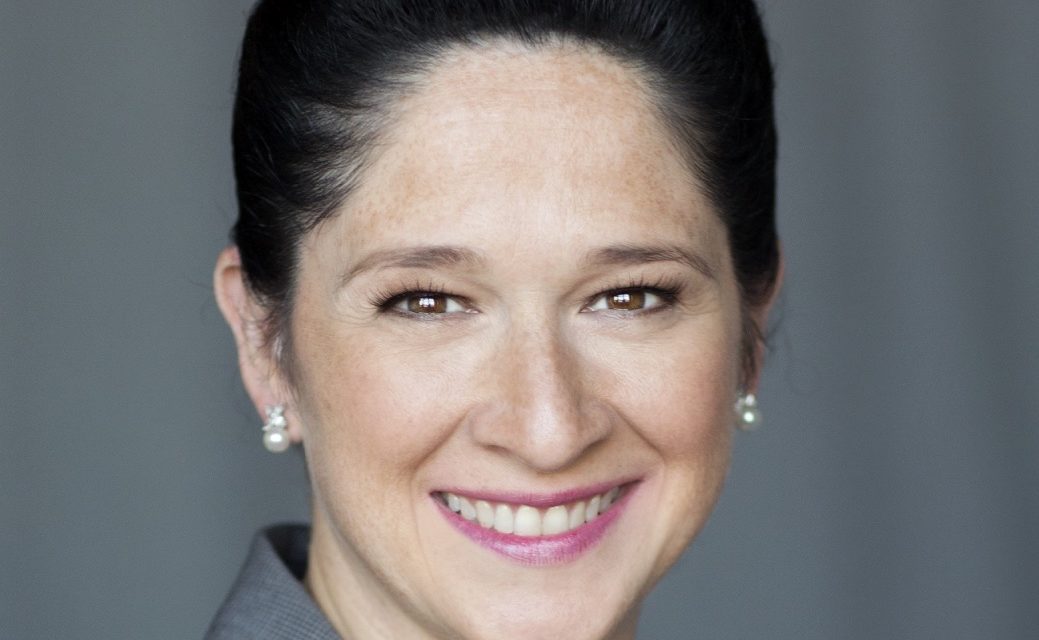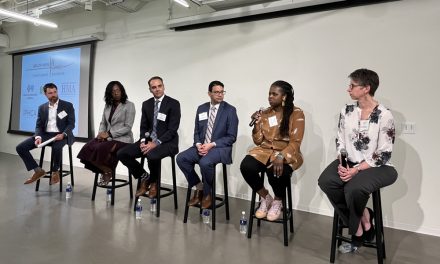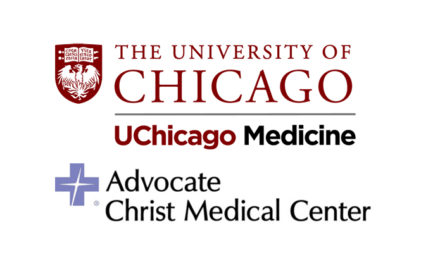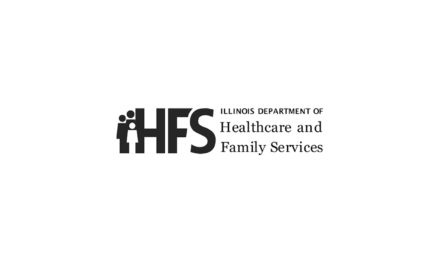
On the Record with Illinois Comptroller Susana Mendoza

Illinois Comptroller Susana Mendoza has been an outspoken advocate for increased transparency in how the state spends its money.
She recently spoke with Health News Illinois about the budget, paying down the state’s $6.4 billion bill backlog (as of June 14) and Medicaid managed care.
Edited excerpts are below.
HNI: How will the recently signed budget affect the state’s backlog of unpaid bills?
SM: Number one, I’m super happy to have a budget. We had it on time and it is very robust. In terms of directly impacting our office, our bill backlog stands at $6.4 billion. We do have a $1.2 billion bonding authorization included in this year’s budget that will be utilized to help us pay back the bill backlog. More importantly, and I do think this is something important to clear up with the general public, when we talk about the $1.2 billion bond deal, that will be utilized in a way that will ultimately save taxpayers money versus cost us money. When people traditionally hear about a bond deal, they think we’re just borrowing money to pay back old bills. But in this case, we’re doing the bond deal in order to pay down bills that are accruing between 9 and 12 percent interest penalties. So we’ll essentially be going to the market and getting anywhere from, best case scenario, 3.5 and, worst case scenario, 5.5 percent, versus paying 12 percent interest. So it will save taxpayers money over the life of the bond deal because we will be paying a lot less in what would be mandated late interest penalties down the road that do not go toward any positive investments for the public.
We did not ask for more than that authority because then you would get into borrowing to pay the bills versus borrowing to refinance a bad deal the state had with these late interest penalties. The best example would be if you were to ask a person, “If you’re paying 12 percent interest on your mortgage payment and could refinance it for 3.5, would you do it?” And there is not a person alive, I think, that would honestly tell you they would not do that.
HNI: How do you prioritize what vendors you pay first?
SM: So we pay our debt service first because we want to make sure we continue to calm the markets, that Illinois is moving in the right direction and is a safe investment. We pay our debt service – our hard debt service – then we pay our pension obligation. We then pay our Medicaid bills. They get the first priority. That’s money going to our most vulnerable people who are sick. So it goes to hospitals and others that take care of them. We prioritize anyone who either treats or is a child or adult with disabilities. So that’s like, boom-boom-boom. Anyone who deals with hospice or nursing care. Essentially we’re hitting our most vulnerable groups first after we’ve satisfied our debt service and pension obligations.
HNI: How much of the backlog is owed to Medicaid?
SM: We still have about $1.6 billion of healthcare bills that are still accruing late payment interest penalties. And we’re paying these pretty much on a weekly basis. Several days ago we did $520 million. Two weeks before that we paid out $1 billion. Healthcare is a priority for me. The bigger issue is what the MCOs are doing with the money once I pay them. That is what I want to know.
HNI: Speaking of managed care, what piqued your interest in this issue?
SM: Certainly what piqued my interest was being the comptroller of Illinois and seeing the amount of money going out the door that I have a complete blind spot on. Over the last two years, I’ve been championing greater transparency in the state, specifically with the realization that no comptroller could possibly do their job to the best of their ability if they had limited visibility on the liabilities being incurred by the state. And at the time, I could not see about 70 percent of all the bills being incurred by the state, yet I was trying to manage through the worst fiscal crisis in its history. Almost an impossible task and we were trying to do the best we could. So that’s why we had this mission, or whatever you want to call it, to create greater transparency in our finances.
So going down that path and seeing one of the largest outputs of taxpayer dollars is in healthcare, and then hearing from people who were connected to ventilators that they were being threatened with being disconnected from their insurance companies if they didn’t pay their bills on time. And then knowing that we do send payments and healthcare companies are taking months to pay the vendors that we paid them to pay. That’s unconscionable to me and we’re really seeing that from the managed care organizations as I talk to the doctors. I’m a very hands-on comptroller. I don’t sit behind a desk. I travel across the state and talk to the providers and listen to their concerns. And it just did not make any sense to me that we’re prioritizing those dollars more than any other comptroller ever has. The minute I get these Medicaid bills, we send them out in days. And I was doing that so the healthcare providers could get their relief right away. Yet they call me and say, “Comptroller, do you know when I’m going to get paid? We sent the invoice in months ago.” And I’m like, “I already paid you.” But I actually didn’t pay them directly, I have to pay the MCOs.
So it started to get very frustrating, and then knowing that the governor was going to go through with consolidating the MCOs down from 12 to seven, and have it be the largest procurement in the history of the state of Illinois with practically no oversight was infuriating to me. I used the example during committee that we had greater oversight on the purchase of paperclips than on one of the largest line items in our budget which impacts people’s quality of life. It’s a life or death thing, and it just didn’t make any sense. So that’s what piqued my interest. And the fact that people were just like, “Whatever.” And I thought, “Oh my gosh, this is crazy.” So it has really become a mission of mine to shine some greater transparency, which will ultimately lead to much greater accountability on how these MCOs are managing the $14 billion of taxpayer funds that are going outside the door today.
HNI: What more do you think should be done?
SM: To me, everything should be driven by data. So show me where MCOs are doing such an awesome job that we should continue going down this path and doubling down on it. If I were an MCO and I could prove that we’re saving the state money and providing better health outcomes, I would be screaming from the top of the mountain tops – which don’t exist in Illinois. But I would have so much money that I could just build one and stand on the top of it and say, “This is what we’ve been able to do!” But we haven’t seen them do that at all because it just hasn’t happened.
So we’ve had limited to no visibility once that money leaves the state of Illinois’ coffers, and it’s just not right. It’s causing safety-net hospitals to close, to phase out certain operations. There’s no way these little hospitals can sustain themselves like that, and they don’t have the ability to hire people to specifically work, as a full-time job, to work on these appeals. And they have these high claim denial rates with MCOs, whereas the private sector has about a 2 percent rate.
So there is some seriously bad stuff going on right there that we cannot really pinpoint yet. But, anecdotally, explain to me why there’s a 26 percent (claim denial rate) from MCOs versus a 2 percent rate. They’re billing the same people, just private versus MCOs, and it just doesn’t make any sense to me. I just find it morally unconscionable and someone needs to be accountable for that. So you will be hearing a lot more from me this year on this issue.
Thankfully, there were some inroads made this year with the budget and the legislation that passed with the clearinghouse that creates greater transparency with the MCO billing and hopefully that will help frontline providers. But I think it’s my moral obligation as the comptroller of the state of Illinois who is responsible for paying the bills and managing the funds to make sure these taxpayer dollars are being utilized to the best of their abilities, and I do not have any level of confidence right now that those $14 billion of taxpayer dollars are being utilized in a way that actually improves health outcomes and helps these providers continue to do their mission of helping the public.
HNI: Anything else?
SM: What I would love to see is a standard way to submit billing. Every MCO has their own way of billing, and it’s just crazy that they’re creating their own cottage market for appeals. Why not just have one unified way of billing the MCOs, which would hopefully dramatically reduce the denial rates? But I just do not think they want to reduce the denial rate. The 26 percent denial rate is not an accident. I do want to see more visibility, and I would like to see further explanations on why the denial rates are so huge compared to the private sector by the same hospitals who are submitting to one group and not being denied and submitting to another and having a huge denial rate.
And right now I have no legal authority to make them give me an answer to stuff. So I would like to see that changed too. So we’re going to implement this legislation and if we still see that these guys are reticent to give us the information that we need to be helpful to the providers and serve our state, then maybe we’ll need to pass additional legislation that forces their hand to be more accountable, either to me or the Department of Healthcare and Family Services or (the Department of Human Services) that we’re able to be responsive to the constituents that are owed money by the state of Illinois.
I think what I’m saying is that we’re just scratching the surface when it comes to MCOs. But it was nice that instead of passing 20 hodgepodge bills or something, they did work on one piece of legislation that seems like a really solid first step.
HNI: How involved was your office in advocating for changes in the omnibus Medicaid bill?
SM: Oh yeah, it’s part of our legislative agenda. Instead of moving forward with our bill, we incorporated what we wanted into the omnibus. I think we have been very active on the MCO side. Last year, I was the one who was calling for hearings on the issue. And I was talking to the governor about it.
HNI: Are you seeing interest from the Pritzker administration in this issue?
SM: I think so. If it weren’t the case I do not think this would have had the really solid working group that it did. I know he wanted the MCOs to give up some more stuff as part of this budget. But I think I just have been around this issue a little bit longer. I want bigger and bolder things done against these MCOs, just to get them in line with what the original reason was why we approved them, to begin with. And that was to provide better health outcomes at a lower cost for the state of Illinois. Now that was a promise, and if they cannot fulfill the promise, then we need to revisit what we need to do to make them fulfill that promise or just go in a different direction. And I’m not against managed care organizations. I’m just against the absolute secrecy that’s involved with these managed care organizations that ultimately impact people’s healthcare outcomes in a negative way.
HNI Switching gears, what needs to be done to improve the state’s credit rating?
SM: We are already taking steps to improve the state’s credit rating. Number one, have some predictability and stability, and I think the markets are going to respond very favorably. They already have. Having this budget, having it done on time and having it done in a bipartisan way and incorporating things that are really going to go far in stabilizing our finances, like paying down the bill backlog. You saw that we got a $1.2 billion authorization for a bond, which is great because we don’t want any more than what we would need to pay the bills in a way that would save taxpayer dollars. I don’t borrow just to borrow. We’re going to borrow only if it means refinancing to save money in the long run. That’s what we’re doing there, and I think they’re going to look favorably upon that. That they didn’t just go crazy and give us a ton of bonding authority. They were actually talking about a larger bonding authority, and I said, “No, we do not need that much.” We only need what we need to be able to save taxpayer dollars, and the rest we will manage accordingly. And every year, hopefully as we retire debt services, if we need to pick up some more because we have bills that are accruing late interest payment penalties, then we talk about that at the time, not just for the sake of doing it. They are also giving us the interfund borrowing authority, which we will also utilize.
There’s also a long-term plan for increasing revenue, and I think the markets just want to know there is stability and predictability and we’re passing budgets that are not based on one-time gimmicks. And clearly, I think, this budget was a step in the right direction. I joke around with JB (Pritzker) all that the time that the thing that gets me excited is the thought of a credit upgrade in our tenure. Most people do not get excited about that. I do.
Health News Illinois is a nonpartisan, independent news service covering the Illinois healthcare beat. Sign up for a free trial to the newsletter here.









